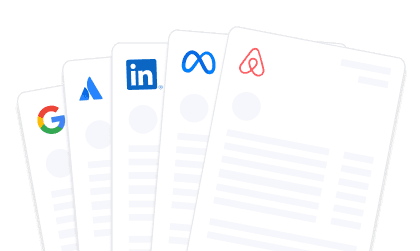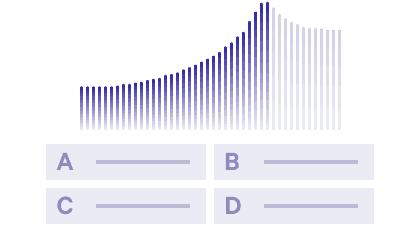The Most Important Product Management Keywords & Skills to Include on Your Resume
Discover the top product management keywords and skills recruiters scan for. Learn how to showcase them on your resume with impact.
Posted October 25, 2025

Join a free event
Learn from top coaches and industry experts in live, interactive sessions you can join for free.
Table of Contents
When you're putting together your product manager resume, it is important to include the right product management keywords and highlight the right product manager skills. In today's competitive job market, hiring managers often rely on applicant tracking systems (ATS) to scan resumes and quickly identify candidates with the right experience. If you want to stand out, your resume needs to be carefully crafted with the right keywords, organized to match the job you're applying for.
In this article, we will walk you through the most important keywords and skills to include on your resume, and explain how to integrate them effectively to improve your chances of landing the job.
Read: What is Product Management?
Why Product Management Keywords Matter on Your Resume
Keywords as Signals of Role Fit and Domain Knowledge
When hiring managers look at resumes, they’re trying to figure out if your experience matches what they need for the job. The keywords you use, like product strategy, user research, and product development process, tell them you have the right knowledge and skills. These relevant keywords will show recruiters that you understand the role and can perform well. Including these terms in your product manager resume will make it clear to the recruiter that you're the right fit for the position.
The Link Between Keywords and Recruiter Scanning Behavior
Here’s a little secret: Recruiters spend just 6 to 8 seconds looking at each resume. In that short time, they’re scanning for the most important product manager skills. Each of us has a limited attention span. If your resume doesn’t have the right keywords, it may be overlooked, or recruiters may lose interest. This is where applicant tracking systems (ATS) come in. ATS looks for keywords to help sort resumes. So, using the right keywords is essential for your resume to make it past the ATS and onto a recruiter’s desk.
Data from The Ladders shows that recruiters spend an average of just 6–8 seconds scanning each resume.
Read: An Expert’s Guide to Resumes: Five Tips to Make You Stand Out
How Recruiters and ATS Systems Use Keywords
How ATS Parses Resumes for Matching Skills and Roles
An Applicant Tracking System (ATS) is a tool used by many companies to help sort through the many resumes they receive. The system looks for product manager keywords that match the job description, like product development, data, and technical skills. When you use the right keywords in your resume, it helps the ATS understand your experience and skills. If your resume doesn’t include the right keywords, the ATS may not flag it for review, and your resume might never reach hiring managers or recruiters. Think of it as a robot that reads your resume to decide if you’re a good fit for the job. If it doesn’t find what it's looking for, it won't even pass your resume to a human for a closer look. This is why it's so important to include the relevant keywords that recruiters are searching for.
Why Phrasing and Formatting Affect Keyword Recognition
It’s not enough to just throw some keywords on your resume. The phrasing and formatting also play a big role in whether your keywords are picked up by both the ATS and the recruiters who eventually read your resume. For example, using bullet points to highlight your accomplishments helps both ATS and humans easily spot the important details. It is also a good idea to keep your resume neat and simple, with enough white space to make it easy to read. This way, the keywords you’ve included, like marketing, project management, and sales, stand out more clearly.
Also, make sure you’re using the right phrases. For example, instead of just saying "I managed projects," say something like, "Successfully led product initiatives, resulting in growth in sales." This not only includes the right keywords like product initiatives and sales, but also shows your success measurably. The better your resume is formatted, the easier it is for both ATS and recruiters to spot your most relevant skills and experience.

Core Product Management Keywords & Skills (By Category)
When building your product manager resume, include the right keywords and skills that match the job you’re applying for. These will help recruiters quickly identify your experience and expertise. Below, we break down the key product manager skills into categories to make it easier for you to understand what to include.
Strategic & Analytical Skills
These are the skills that help you set the direction for a product and make decisions based on data and research.
Market Research: This involves understanding market trends and user behavior. Use keywords like market analysis, competitive analysis, and data analytics in your resume.
Product Strategy: This shows your experience in developing a plan for the product and guiding it from start to finish. A strong product strategy helps ensure the product meets the needs of users and achieves business goals.
Data Analysis: Tools like Google Analytics or other data analytics platforms help you understand how well your product is performing. It’s important to show that you can interpret data to make decisions.
Example Resume Bullet:
- Conducted market research and competitive analysis, using data analytics to inform product strategy and optimize user engagement, increasing retention.”
Execution & Delivery Skills
Agile methodologies: Demonstrate familiarity with agile methodologies to manage product development.
Roadmap planning: Product roadmap planning helps define product initiatives and aligns cross-functional teams.
Product launch: Managing the launch of new features or products is key. Include keywords like product launch, product roadmap, and product vision.
Example Resume Bullet:
- “Led the agile team through backlog grooming towards a successful product launch of three new features within the quarter.”
Read: Mastering the Product Roadmap: Templates, Examples, and Tips
Leadership & Collaboration Skills
Cross-functional teams: Show your ability to lead and collaborate with marketing teams, engineering teams, and design teams to drive product initiatives.
Stakeholder management: Managing internal and external stakeholders is a key leadership skill.
Written and verbal communication skills: As a product manager, you need to communicate effectively with both technical and non-technical teams.
Example Resume Bullet:
- “Led a cross-functional team to align on our product vision.”
Customer & UX Skills
User research: Conducting user research and usability testing to identify pain points and improve user experience design.
Design thinking: This process helps refine product decisions to better meet user needs.
Example Resume Bullet:
- “Conducted user research and usability testing, resulting in a product design that reduced user frustration.”
Read: The 20 Most Important Product Manager Skills
Product Management Keywords by Career Level
Different stages of your career require different sets of keywords to reflect your growing responsibilities. Tailoring your resume to include the right pm keywords for each career level is crucial to demonstrating your experience.
Entry-Level / Associate Product Manager (APM)
At this stage, your focus is on learning the ropes and supporting the product team. The most relevant keywords include user research, wireframing, competitive analysis, and user stories. These skills show that you understand the basics of the product development process and are capable of supporting more experienced PMs.
Read: Associate Product Manager (APM) Resume Guide — With Examples
Mid-Level Product Manager
As a mid-level PM, you’ll be taking on more responsibility, including driving product initiatives and managing projects. Important keywords for this stage are KPIs, GTM strategy, backlog prioritization, and cross-functional alignment. These demonstrate your ability to lead efforts, manage timelines, and work across teams like marketing, engineering, and design to achieve business goals.
Senior / Director-Level Product Manager
At this level, you are responsible for leading the product vision and driving product strategy. Keywords at this stage should include product vision, portfolio strategy, revenue growth, and stakeholder management. These reflect your ability to manage large teams, align stakeholders, and drive the overall direction of the product to meet business goals. You’ll also need to show your experience in security and technical decision-making as you lead cross-functional teams.
Note: You need to understand what recruiters expect at each career level and then tailor your resume to reflect the skills and key achievements at your stage of the product management career.
Read: An Overview of the Different Roles in Product Management
How to Incorporate Keywords Effectively on Your Resume
Place Keywords in Bullet Points, Not Just the Skills Section
Don’t just list keywords in your skills section. Use bullet points to highlight specific examples of how you’ve used these skills. Combine keywords with metrics to show your business value.
Example: “Led roadmap planning and user research that drove a 15% increase in user retention over six months.”
Align Your Resume with Job Descriptions
Carefully analyze job descriptions and include the keywords recruiters are looking for. This will increase your chances of passing through ATS filters and being noticed by hiring managers.
Common Mistakes to Avoid with Your Product Manager Resume Keywords
Keyword Dumping Without Context or Results
Including keywords without explaining how you’ve used them won’t make your resume stand out. Always provide context and examples that demonstrate your accomplishments.
Using Vague Buzzwords
Avoid generic buzzwords like “innovative” or “passionate” without specifics. Focus on actual product manager skills, such as roadmap planning or stakeholder management.
Copy-Pasting Job Descriptions
Never copy and paste a job description verbatim into your resume. Personalize it to show how your experience matches the role.
Downloadable Product Management Keywords List & Template
This template will help you quickly identify the most relevant keywords to include on your resume. These keywords are broken down by skill area and career level, so you can easily tailor your resume to the job you’re applying for.
Download link here.
Resume Bullet Checklist: Review Your Resume’s Impact and Keyword Balance
Use this checklist to ensure your product manager resume is both impactful and well-balanced with the right keywords. Follow these steps for each resume bullet:
1. Focus on Action and Results
- Action Verb: Does each bullet start with a strong action verb?
- Results-Oriented: Are you showcasing the results of your actions?
- Measurable Impact: Have you included measurable metrics?
2. Include Relevant Keywords
- Core Product Management Skills: Are you using relevant product management keywords like market research, product strategy, data analysis, and agile methodologies?
- Career Level Keywords: Have you included the right keywords for your career stage?
- Job Description Matching: Are you aligning your keywords with those in the job description?
Note: Make sure you’re using terms recruiters are looking for.
3. Highlight Key Achievements
- Key Achievements: Are you focusing on key achievements instead of just listing tasks?
- Business Value: Are you showing how your actions contributed to the company’s business goals?
4. Use Clear and Concise Language
- Clarity: Is the bullet point clear and easy to understand? Avoid jargon or unnecessary complexity.
- Conciseness: Are you keeping each bullet point short and to the point?
Note: Avoid lengthy descriptions and focus on the most important details.
5. Proper Formatting
- Bullet Points: Are you using bullet points to make the content easy to read and scan? Avoid large blocks of text.
- White Space: Is there enough white space on your resume to make it visually appealing and easy to read?
- Consistent Format: Are your bullet points consistently formatted, with the same structure and style throughout?
6. Tailor for Each Job
- Tailored Content: Have you tailored your resume bullets for each specific job? Ensure keywords and skills match the job description.
- Focus on Impact: Adjust your resume to highlight the most relevant achievements for each role.
Note: This checklist will help you make sure your resume stands out with impactful resume bullets and the right keywords. Review each bullet and ensure it aligns with these best practices!
The Bottom Line
When you're completing your product manager resume, it’s important to focus on using the right keywords that highlight your skills and work experience. Think about the product roadmap, market research, data analytics, and sales skills that recruiters are looking for. By including keywords like agile methodologies, product vision, and user research, you’re making it clear that you understand the role. Use metrics to show the success of your initiatives, like improving user engagement or managing product development projects. With excellent verbal and written communication, you’ll demonstrate how you’ve developed and contributed to your past roles, making it easy for recruiters to spot your potential.
Get Personalized Help from Our Experts
If you’re ready to optimize your product manager resume, our expert coaches can help. Contact us today to get started on your path to landing your next product management role!
Deepen your knowledge and read these next:
- 20+ Free Product Management Resources
- How to Write a Powerful Product Management Cover Letter
- Product Manager Case Study Interviews: What to Expect, Questions, & Examples
- Top 10 Soft Skills Coaches
- The 10 Most Common Product Management (PM) Behavioral Interview Questions
- Product Execution Interview: What It Is, Questions, & Tips
- How to Run the Best Product Manager Mock Interview
- How to Find Remote and Part-Time Product Management Jobs
- How to Get Into Product Management (An Expert's Perspective)
- Is Product Management a Good Career? PMs From Top Companies Weigh In
FAQs
How do Applicant Tracking Systems (ATS) use keywords?
- ATS are used by companies to help hiring managers quickly sort through many resumes. They scan resumes for specific keywords related to the job description. If your resume includes the right keywords, like project management, engineering, or a product manager resume, the ATS will flag it as a good match for the role. This makes it more likely that your resume will be seen by a human. Without the right keywords, your resume might not even get past the ATS.
What’s the best way to add keywords to a resume without keyword stuffing?
- The best way to add keywords to your resume is by using them naturally within your job descriptions and work experience. Instead of just listing keywords, focus on how you’ve applied them in your previous roles. This shows how you’ve used written communication skills and gives context to the keywords you’re using, making your resume both clear and impactful.
Should I customize keywords for each job application?
- Yes, you should customize your resume for each job you apply to. Carefully review the job description and match the keywords in your resume with the ones mentioned in the job post. This helps ATS and hiring managers quickly see that you have the skills they are looking for. By doing this, you make sure your resume stands out and shows you’ve taken the time to tailor your work experience to the job.
How often should I update the keywords on my product manager resume?
- It’s a good idea to update your resume every few months or whenever you gain new skills or complete new projects. This helps you stay current with new keywords in your field. For example, if you’ve worked with a new tool or technology, make sure to add it to your resume. Updating your resume also ensures that it reflects your most recent initiatives and achievements in product management or related fields.
Should I use different product management keywords for FAANG vs startups?
- Yes, you should use different keywords based on the company you're applying to. For FAANG companies, focus on technical skills, product roadmap development, and scalability. For startups, emphasize your ability to handle multiple roles, your adaptability, and your experience working with cross-functional teams. Keywords like designers, engineering, and product initiatives may be more relevant for startups where you wear many hats.
Can I include product management keywords even if I don’t have formal PM experience?
- Yes, you can still include even if you don’t have formal PM experience. If you’ve worked on projects that involved product strategy, collaborating with designers, or managing product development in any capacity, those are relevant experiences. Be sure to include keywords like project management, user research, and product strategy to show your potential as a product manager. You can also highlight any work experience where you contributed to product initiatives or helped guide product decisions.































